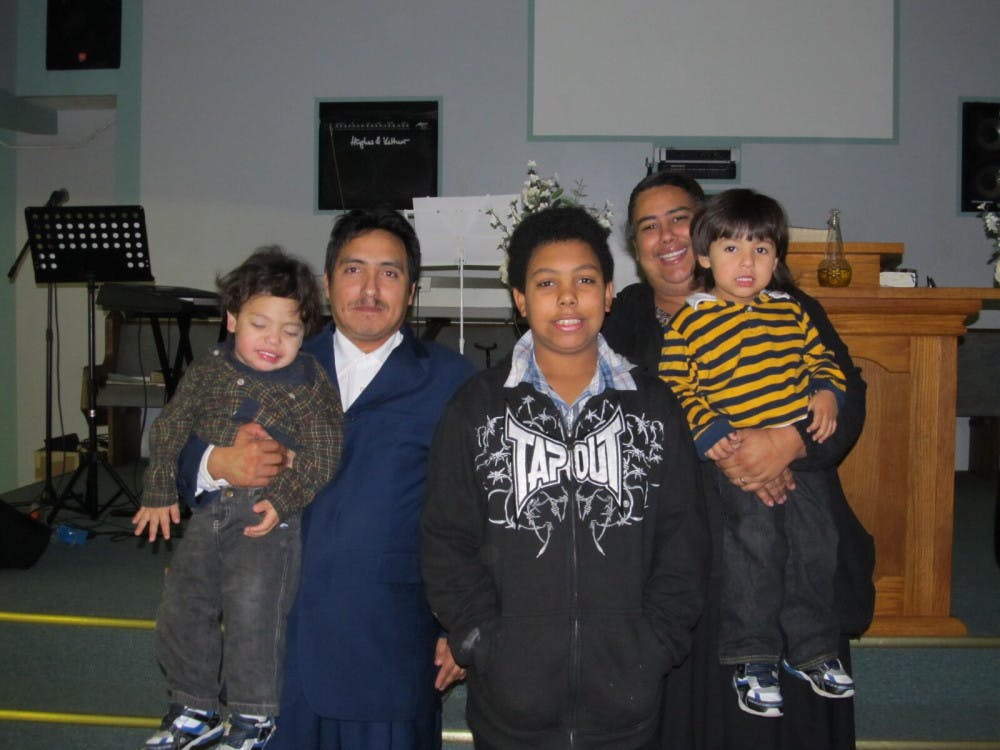Every night for the past six years, Lina Colondres and her husband Ruben Flores Garcia have stayed up thinking of each other — 1,681 miles apart.
In Guanajuato, Mexico, Flores lies awake wondering if his wife can feed their three sons and pay the bills. Colondres lies awake in Gainesville wondering if he’s eating, if he’s safe, if he’s alive.
They’ve been separated by a border since March 26, 2012.

Ruben Flores Garcia in Mexico in 2015
When Immigrations and Customs Enforcement officers detained Flores while he was working at a chicken plant in Albertville, Alabama, he was the family’s sole provider. A week after his deportation, Colondres and their three sons were evicted from their trailer home and lived in a shelter before driving to and settling in Gainesville.
Their oldest son dropped out of high school and helps his mother around the house. The younger boys still wake up from nightmares, screaming for their father.
“He was ripped out of our lives,” Colondres said.
The memory of her husband’s deportation still haunts her.
“Ever since that day, I don’t know how to smile the natural way,” she said.
Colondres has been fighting to reunite her family for six years. The 46-year-old found an attorney who works for free. But she suffers from arthritis, diabetes, asthma and dislocated discs in her spine, and she’s too sick to work. She said she needs help to put together the money for her husband’s immigration application and travel fees — a total of $5,000. As her husband waits for immigration officials at the U.S. consulate in Mexico to schedule an appointment to possibly grant him re-entry, Gainesville residents are fundraising to help bring him home.
But the clock is ticking. Flores and his family have at least a couple of weeks to pull the funds together before the appointment is scheduled, Colondres said. If the money isn’t raised, Flores will miss the meeting.
Karen Epple, a 64-year-old social worker, created a GoFundMe page April 16 with a goal of $5,000 to cover the expenses. As of press time, the page has raised $530.
Epple met Colondres and her sons about two years ago through a mutual friend, Annette Gilley. Epple said Gilley and their group of friends have helped the family by offering clothes, food and car rides.
“If they wouldn’t have been there, I don’t know where I would be,” Colondres said. “It’s been the biggest blessing of all.”
The Flores-Colondres family is one of 3.3 million “mixed-status” families, who have both undocumented and citizen members, living in the United States, according to the Journal on Migration and Human Security.
Data on the amount of undocumented immigrants living in Alachua County is scarce. Pew Hispanic estimates 1.2 percent of Gainesville’s total population is undocumented.
Nearly two-thirds of undocumented immigrants have lived in the United States for at least a decade, according to a Pew Hispanic report. Almost half of those immigrants, including Flores, were parents.
In 2016, UF students helped Colondres raise money for the first round of Flores’ legal fees, according to Alligator archives.
Flores thinks about his deportation, his family and his chance of returning to the United States every day. He said he suffers without his wife and children.
“Every day I wake up with the hope that I’ll see them again,” Flores said in Spanish. “That’s why I’m standing today. Without them, I would’ve fallen a long time ago.”
In addition to Epple and her friends, Colondres found support in the Westminster Presbyterian Church, which is accepting donations for Flores’ fees. The Rev. Larry Green said church members have donated about $1,500 to the church’s fund in six months.
“This is not a family that isn’t willing to do it for themselves,” Green said. “This is a family that’s so stuck in the system, they can’t really get out of it.”
Colondres was born and raised in Puerto Rico before moving to New York City in 1985. While living in the Bronx, Colondres had two children from a previous relationship: 23-year-old Kristina, who now lives in Orlando, and 21-year-old Felix Santana. Their father was not in their lives as they grew up, but Flores was.
Flores came to the U.S. from Mexico in 2000 to save money to send to his family after his father fell into a diabetic coma. But by the time he had enough extra cash to send home, his father died.
He moved to Gainesville that same year to work in construction and lived on the same block as Colondres.
They met on Mother’s Day 2004 when he and his friend knocked on her door. His friend’s van needed a jump, Colondres said.
“They say Prince Charming don’t come knocking on your door, but mine did,” she said.
They hit it off right away as they stood outside speaking in Spanish, Colondres said. She noticed Flores blushing.
Flores earned $500 a week before his deportation, Colondres said. Today the family survives on Colondres’ monthly $500 disability check and $200 in food stamps. She was diagnosed with breast cancer last year.
Rent and utilities deplete half of her funds, but she allocates enough for international phone service to call Flores twice a week. She struggles to feed and clothe her sons — 21-year-old Santana, 10-year-old Ruben Jr. and 9-year-old Marcelo.
Flores’ absence has taken its toll on his children. U.S. citizen children who lose one or both parents to deportation are impacted emotionally, physically and mentally, according to a 2013 study by Human Impact Partners, a health policy research group.
The study found an increase in behavioral issues, poorer overall health, food insecurity, educational issues and poverty.
The day Flores was detained wasn’t just another day — it was Marcelo’s third birthday. Flores left for work at 6:30 a.m., planning to pick up his son’s birthday cake on the way home, Colondres said. The kids were excited to go to Cici’s Pizza for dinner.
Marcelo sat for hours staring out the window waiting for his father to come home with a cake, a smile and a hug.
But he never came back.
As the days went on, the children started to feel the impact of losing their father.
Santana lost the only father figure he had in his life.
Ruben stopped eating.
Marcelo had to repeat the second grade.
Both Ruben and Marcelo struggle with anger-management issues.
“What’s my citizenship worth if I couldn’t keep my husband home?” Colondres said.
Flores currently lives in an area swarmed by the Jalisco drug cartel in central Mexico. He hears gunshots every day. Three months ago, the 40-year-old said he was beat up by three thieves who broke into his car. They bruised his ribs and cracked his head with a wooden stick before running away. He couldn’t afford to go to the hospital.
In San Luis de la Paz, a town where anyone roaming the streets after 10 p.m. is vulnerable to gang violence, Flores works from 6 p.m. to 10 a.m. as a factory worker. He told his wife he doesn’t know if he’ll survive the year.
Flores said he prayed to the Virgin Mary to reunite his family. He’s amazed by the people donating money without knowing him. This is how the Virgin Mary is answering his prayers, he said.
“I’ll never get tired of thanking the people who are helping me for as long as I live,” he said.
In 2010, the family’s original immigration lawyer advised them to move from Gainesville to Alabama to find work, Colondres said. The couple paid the lawyer $2,000 to try Flores’ case in Alabama, but they never heard from her again. Flores’ files were never transferred, and he was unaware of a court hearing in Orlando.
Evan George, the family’s current immigration lawyer, has provided the family free legal services since 2015. George said Flores is prepared to submit a waiver to allow himself re-entry due to his family living in poverty without him.
“If you can prove his absence would cause extreme financial, medical and emotional hardship, the government can make an exception,” George said.
Colondres is scared. She bites her nails and prays on her knees in anticipation. She watches as Ruben looks up at the sky before school, praying for his father to come home.
Ruben lines up his toy trains on the floor and drives them in circles. He said he misses watching Thomas the Tank Engine with his dad. When he sees him again, he wants to spend the day alone with him, plan a trip to the park and ride a train for the first time together.
“He told me that he loves me from here to the moon,” he said. “I told him that I love him from here to the universe.”
Flores thinks about his deportation, his family and his chance of returning to the United States every day. Although he’s nervous to meet with the U.S. Consulate, he said he suffers without his family.
“I hope to someday give them everything that I couldn’t for the past six years,” Flores said. “Every hug, every kiss, all of that love that they’ve been missing.”
Staff writer Jimena Tavel contributed to this report.
Contact Amanda Rosa at arosa@alligator.org. Follow her on Twitter at @AmandaNicRosa.
The Flores-Colondres family poses for a photo at an Alabama church in 2010.






